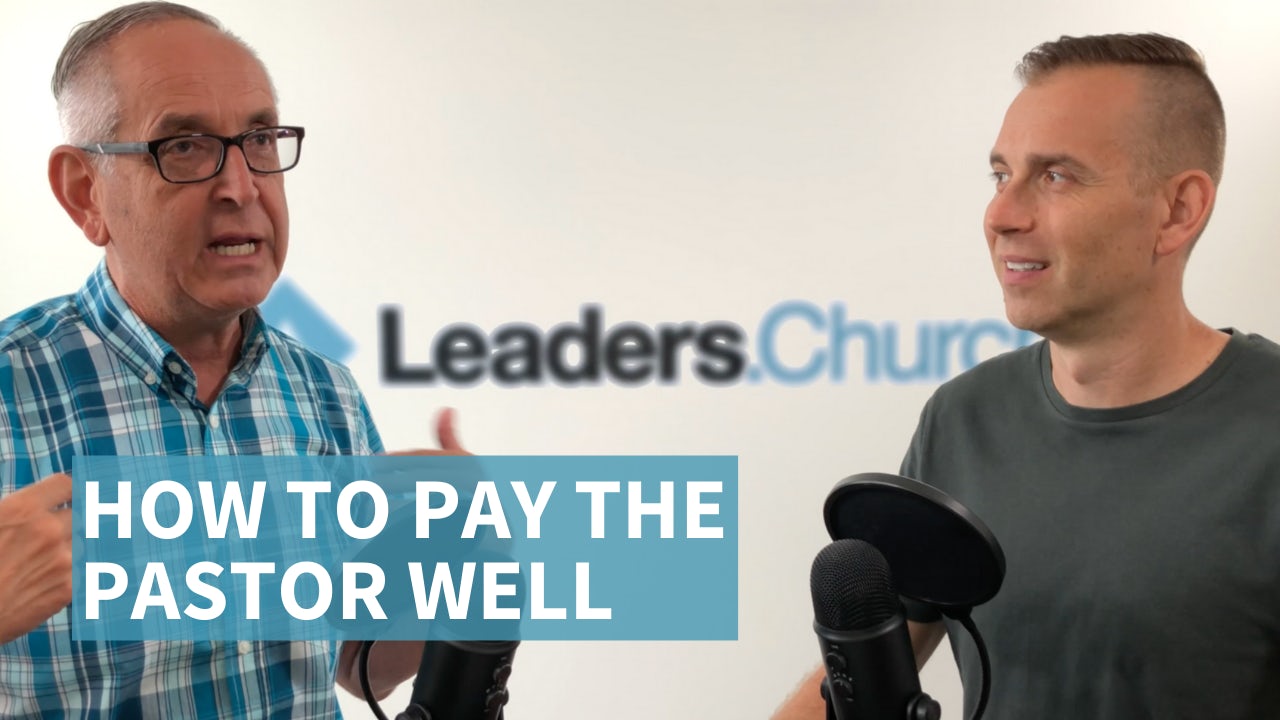020 – How to Pay the Pastor Well
What’s in this Episode?
Pastors are notorious for not wanting to talk about how much money they make. And if I’ve heard it once, I’ve heard it 100 times: “I’m not in it for the money.” And we’re glad they’re not in it for the money. But the reality is, churches need to pay attention to how they pay their pastor. And to do it. Well, that’s exactly what we’re going to talk about in this particular episode.
Read the Transcript
Dick Hardy 0:28
You know, over the years of my career, I’ve had the privilege of serving to really great churches, and as part of what we would do every fall, generally October/November, we would talk about the compensation that we would want to set for the entire staff but specifically the lead pastor. And this always became a discussion point. It was honestly never a tension point, but it was a point that pastors are frequently just not comfortable talking to about the subject. You know, they’re not in it for the money, and so on and so on. But my role as the administrator, administrative pastor was to help bring things to the table that would help the board help the pastor help the team be able to move forward. And so we used a couple of instruments primarily over those years. The Church Law and Tax Report, Richard Hammar, we’ll talk about it here in a second, and ministry pay. But merging those two together really helped us not have anybody’s opinion involved as to what the pastor’s compensation would be. And that’s really what you want. You want to be sure you’re moving away from opinion. And you’re dealing with what the market bears, which is kind of an odd term, sometimes for churches to use, but that’s what we did. And it served us well, really for decades in helping set compensation for pastors. So we want to jump into that here today and talk about the nuts and bolts and the nuances of how you can set the compensation for your pastor and do it in an honorable way.
Jonathan Hardy 2:02
Yeah, one of the things we’re going to be covering in this episode today is how to navigate that discussion, which, as you mentioned, is so tricky for pastors. But as we talked through this today, we’ll find out, hey, we can do this, you can do this in a way that isn’t hard, isn’t awkward, and it’s going to be helpful.
Dick Hardy 2:22
Reduces the tension.
Jonathan Hardy 2:23
Yeah. So just all the way around. It’s gonna be very, very helpful. So, Dick, why don’t you jump in and give us some of the thoughts that you have on how to navigate this tricky subject?
Tip #1: Obtain Comparative Data
Dick Hardy 2:33
Well, the very first thing to do is to obtain comparative data. Because you’re sitting there going, “well, I don’t know. What should we pay our pastor?” Well, there is data out there. There’s research out there. And there’s a couple of major sources that I still use when I’m doing consulting with with pastors. I just did it for a church here three or four weeks ago from the time of this recording and help them navigate what the the market says now, the very first one is the Church Law and Tax Report. And we’ll have the website there. Where do we put that website? We put the website there in the notes, is that where that’s going to be available? Yeah, so you can just go to that website. And this is Richard Hammar compiles this information of churches all across the country. And what you’ll do in this report well, and the other report, the other one is ministry pay. Now, ministry pay is a web based tool that you pay a nominal annual membership for and you go in there and you put in your data, you put put the size of the church, put in region of the country, budget and what kind of a community.
Jonathan Hardy 3:49
Yeah, and then one of the things I love about this one is you can go as detailed as you want. You can talk about a specific role. So if you have a student pastor, you can do that. Obviously for the lead pastor, you can. And so it breaks it up and it takes the data from all the churches that have submitted data to this ministry pay so that way, it’s pulling all this data of what’s really happening in churches.
Dick Hardy 4:13
And when you do this with ministry pay, sometimes you’ll get a sampling because it’ll show you how many actually were part of that survey. You know, if you get a sampling of two or three, that’s not a big enough sampling. So you can expand. That’s the advantage of the web base. You can expand. Say your church is running, pick a number, running 500 and you put in 500, well, you may need to go to 400. You may rather than saying 500, you need to say 300 to 700 in order to broaden your sampling. And then when you pull all that together, I would merge those. I had a formula that I did, where I took what came out of Richard Hammar’s document what came out of ministry pay, I put them on a compilation page, of course if you’re an Excel guru you know how to do this, and pull this together. So you literally have a specific number that you’re targeting. That’s not your opinion. It’s not the board’s opinion. It’s nobody’s opinion. It’s data of other churches.
Jonathan Hardy 5:16
And I’m going to interject on that because the numbers don’t lie, right. And the important thing about obtaining comparative data is you have facts. And, you know, I’m just a big fan of let’s get to the facts. Let’s not talk about opinion, or something that’s subjective or something that’s just perception. We have to go to the facts and the facts are what the numbers say and so that’s why it’s just so helpful. Now, let me ask you a quick question on this. Is this for U.S. churches only?
Dick Hardy 5:44
Yes, this is for U.S. churches. Certainly, Canadian churches could use it and be fairly close. I’m just not sure. I think if you’re in the UK or Australia, other countries, you’re going to need to make your adjustments accordingly. I really wish I had a better handle on that. Maybe that’ll be something we’ll work on here in the future.
Jonathan Hardy 6:07
Well no, but that’s good just to clarify.
Dick Hardy 6:08
It certainly would work for US and Canada.
Tip #2: Pay At The 75th Percentile
Jonathan Hardy 6:11
Yeah, yeah. So okay, so as you’re doing this, you’re pulling the data together. Then the second thing you want to talk about is how do you determine where the pastor’s salary should be in comparison to all of this.
Dick Hardy 6:24
Because what’s you’re going to find in the Richard Hammar Church Law and Tax, you’re going to find that the numbers, those were paid at 25 percentile, the 50 percentile, the 25 percentile. And for those of you who you’re not math oriented this way, if someone is paid in the 75 percentile, which is what we recommend, we recommend that you get to the 75 percentile, that means 25% of pastors are paid more than you ,75% are paid less. Now let me just have a little fun with this. I’ll deal with church boards and when it comes to this conversation. And here’s one of the first questions: “Well, what’s the average?” To which I then say, okay, do you have an average pastor? “Oh, no, no, we have an above average pastor.” Okay? You have an above average pastor, but you want to know the average? Don’t pay average, who wants an average pastor? You don’t want an average pastor, you want an above average pastor. So therefore, you want your compensation to be above average. So you want to pay at the 75 percentile mark. Ministry Pay, by the way shows 90 percentile, 75, 50, and 25 I think. Point being you want to get your numbers to be and pay at the 75 percentile and if you’re not there, lots of churches aren’t there. The church I was just dealing with here a few weeks ago was not even close. Well, I would recommend taking a couple of years to work yourself to that point. So you probably, unless you got money growing on trees, I haven’t found a lot of trees or a lot of churches like that, you’re probably not gonna just be able to do it overnight. But you do need to move that direction and you need to do it probably within about two to three years. So yeah.
Jonathan Hardy 8:09
That’s really good.
Dick Hardy 8:09
Okay, what else we got here?
Tip #3: Look For Non-Salary Ways To Help Pay The Pastor
Jonathan Hardy 8:11
Well, so then the next thing that needs to happen is, as you’re looking to increase the pastor salary, is to look for non-salary ways to help pay the pastor, to compensate the pastor. So there’s some little tricks of the trade.
Dick Hardy 8:27
This guy’s good on this one.
Jonathan Hardy 8:29
Well, where you are compensating them but you’re not compensating them through salary and through the benefits. It’s not showing up on their W-2. There’s other things you can do and so you need to look for what are some ways we can take care of the pastor for like things that he already pays for or she already pays for, that the church can just pay for instead. So a classic case is, if I can use this example is, I know a pastor who the church actually pays for their lawn care. So that the pastor can focus on the ministry and not be bogged down with just taking care of their home and all that. “Well hey, why don’t we just take care of your lawn care? it’s one less thing for you to do personally, Pastor, and it’s a way for the church to help provide.” And it’s just a simple thing like that. Now, I don’t know, I’m not a tax guy. So I don’t know how that works logistically.
Dick Hardy 9:21
Well, I’m sure there’d be some CPA or attorney someplace who would say you’re gonna have to make that taxable, but you know.
Jonathan Hardy 9:30
You talk to your CPA.
Dick Hardy 9:31
Yeah, talk to your CPA, but I mean, be nice to your pastor. Do some nice things for them that don’t show up on the, you know, salary, housing benefits kind of thing, and your pastor would be grateful for that.
Tip #4: Do Not Make Comparisons To What People In The Church Make
Jonathan Hardy 9:44
Yeah. Number four is do not make comparisons to what people in the church make. I think this is a very, very important point. That you know, when it comes to setting the salary, it doesn’t matter how much money the board members make, whether they make way more or way less, it doesn’t matter about the people in the church. You need to pay based on the data that we talked about in the first point here of you know, what’s the market?
Dick Hardy 10:13
What’s the market say?
Jonathan Hardy 10:15
Yeah, yeah.
Dick Hardy 10:16
The reality is a pastor’s are, yes, they’re in a spiritual field as called of God, but they’re in a market of people that’s different than a plumber, a lawyer, a stay at home mom, and a surgeon. And honestly, I’ve used this with with church boards that will say, Well, people in our church aren’t getting raises, so pastors shouldn’t get a raise. Or, you know, our people don’t make that kind of money, so our pastor should make that kind of money. Well, if you use that rationale all the way through, that would say to pastors, you need to pastor only rich churches.
Jonathan Hardy 10:52
If they want to make more money.
Dick Hardy 10:53
Yeah if you want to make money, you ought to only pastor rich churches. Never pastor a lower economic church. Well, what kind of sense does that make? That is just wrong. So you pay per the market of pastors using the data that we just talked about.
Tip #5: Look At Your Community
Jonathan Hardy 11:07
Number five. The other thing to do that can be helpful, now, you’re going to think I’m talking out of both sides of my mouth here, but is to look at your community, because that is factored in those, particularly in the Richard Hammar Church Law and Tax. Look at your community. What does a school superintendent make? What does a Chief of Police or Fire Chief make in your community? So those are secular comparisons to the Leader of the Church. So leader of the schools, leader of a public entity, police, fire department, leader of a church. Those are other legitimate comparisons to make.
Tip #6: Make The Topic Of Compensation Part Of The Board Minutes
Jonathan Hardy 11:51
And then, the final thing you want to make sure to remember is that you make this part of the board minutes, so that way every fall or whenever it comes time for you to do the annual salary increases, that it’s on the board agenda. And that’s so helpful, because then it doesn’t force the pastor to have to try to bring this conversation up. Rather, it’s just expected that this conversation is going to happen. And then that kind of helps make things a little bit easier for, especially for the pastors. They’re trying to talk about the board because it can be awkward for pastors, they, you know, they don’t want to, they don’t want to feel like they, you know, are asking for money all the time. But we do need to be taking care of them.
Dick Hardy 12:33
So here’s the way this works. Pick a month. November. You’ve just done the compensation for the pastor. The pastor should say to the board, “board, should we be putting this on the agenda every October/November to talk about? And you know what the board’s response is going to be? Yes, Pastor do that. Then put that in the November minutes. The board recommended that the subject of compensation be brought up at the October or November meeting every year. So when next year comes around, Pastor, you’re not feeling like you’re just bringing it up because you want money. What you’re doing is you’re doing what the board minutes said to do. You’ll say the next year. Hey, guys, you’ll remember in the minutes of the November blah blah blah meeting last year, you said, to bring this back up, so I’m bringing it back up. Yeah, I’m really going to make a lot easier for yourself if you’ll do that.
Recap:
Jonathan Hardy 13:32
Well, hey, let me just summarize. We’ve covered a lot of ground here in this time together today. So let me summarize real quick. the six points we mentioned on how to pay the pastor well and what to do in order to make this happen on a regular basis. The first thing is to obtain comparative data. Second thing is to target to pay at the 75th percentile. Third thing is to look for non-salary ways to pay the pastor. Fourth is, do not make comparisons to what people in the church make. Fifth thing is to make local comparisons with other positions, maybe in the community. And then the sixth and final thing is to make part of the board minutes that the pastor is to put compensation on the board agenda every time in that fall, October, November or whatever. Any final thoughts on that?
Dick Hardy 14:19
No, I think we’ve covered it. And this is very, very important to pay attention to the detail of this, if you’ll do this, you really are going to put aside these tension points and this argument, and frankly, the church is going to move forward because they’re going to operate the way God would want the pastor to be compensated.
Jonathan Hardy 14:40
Yeah, that’s good. Well, I want to make a quick announcement that next week, we are launching a brand new ministry course for kids pastors. And so if you are a kids pastor by chance, or if you have a kids pastor at your church, you have to get this. This is a 44 video course. It’s part of our Church University online education for pastors. And so these are full blown courses that we produce. And this course is just chock full of gold nuggets.
Dick Hardy 15:11
Oh my goodness it is so good.
Jonathan Hardy 15:12
Yeah, it’s gonna be awesome. So stay tuned to that coming up next week, launching next Wednesday. And we’re excited to be able to make that available to you. As well, if you have not yet done so, subscribe, whether you’re watching on YouTube, whether you’re listening on one of the podcast platforms, make sure to subscribe and we’d be honored if you would rate and review this podcast so that way we can continue to get the word out and help other pastors get the church tips they need to go to the next level. So thanks so much for being with us today. We look forward to seeing you next time.
Subscribe & Follow:
- Subscribe on Apple Podcasts
- Follow on Spotify
- Subscribe to YouTube Channel
- Subscribe on Google Podcasts
- Like us on Facebook
- Follow us on Instagram
- Follow us on Twitter









